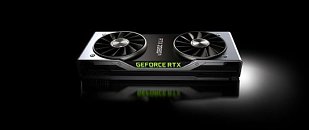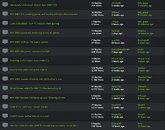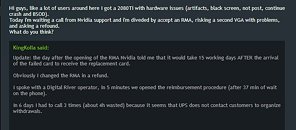Raevenlord
News Editor
- Joined
- Aug 12, 2016
- Messages
- 3,755 (1.19/day)
- Location
- Portugal
| System Name | The Ryzening |
|---|---|
| Processor | AMD Ryzen 9 5900X |
| Motherboard | MSI X570 MAG TOMAHAWK |
| Cooling | Lian Li Galahad 360mm AIO |
| Memory | 32 GB G.Skill Trident Z F4-3733 (4x 8 GB) |
| Video Card(s) | Gigabyte RTX 3070 Ti |
| Storage | Boot: Transcend MTE220S 2TB, Kintson A2000 1TB, Seagate Firewolf Pro 14 TB |
| Display(s) | Acer Nitro VG270UP (1440p 144 Hz IPS) |
| Case | Lian Li O11DX Dynamic White |
| Audio Device(s) | iFi Audio Zen DAC |
| Power Supply | Seasonic Focus+ 750 W |
| Mouse | Cooler Master Masterkeys Lite L |
| Keyboard | Cooler Master Masterkeys Lite L |
| Software | Windows 10 x64 |
It has been been making the rounds now on various forum sites (including our own TPU) that problems have been cropping up for users of NVIDIA's Turing-based architecture graphics cards. The reports, which are increasing in number as awareness of the issue increases, vary in their manifestation, but have the same result: "crashes, black screens, blue screen of death issues, artifacts and cards that fail to work entirely," as reported by the original Digital Trends piece.
Of course, at the time, problems with the source for the information were too great to properly discern whether or not this issue stood beyond the usual launch issues and failures that can (and will happen) to any kind of hardware. The fact that people with negative experiences would always be more vocal than those without any problem; the fact that some accounts on the reported forums were of doubtful intent; and that the same user could be posting across multiple forums would always put a stop to any serious measurement of the issue. Now, though, NVIDIA has come out with a statement regarding the issue, which at least recognizes its existence.


Problems have been cropping up with both NVIDIA-made and AIB cards from various manufacturers, which seemingly rejects the possibility for manufacturer-based issues, and leaves on the table either an architectural or manufacturing batch issue (no confirmations yet). Let's hope this really is confined to a batch issue, though there have been multiple reports of users that got their cards RMA'd and then got one or two replacements that met ther same fate). The issue seems to be affecting owners of the flagship RTX 2080 Ti the most, though there are reports of 2080 models being affected as well.


In response, NVIDIA acknowledges the issue, but limits its relevance: as reported by Tom's Hardware, the company said that "it's not an increasing number of users" affected by this problem, saying "it's not broad." It then added that "we are working with each user individually like we do always." We're here to wait and see, but this definitely doesn't do any favors in grabbing more sales for the RTX 20-series, when the flagship graphics card costing over $1,000 fails on users.
View at TechPowerUp Main Site
Of course, at the time, problems with the source for the information were too great to properly discern whether or not this issue stood beyond the usual launch issues and failures that can (and will happen) to any kind of hardware. The fact that people with negative experiences would always be more vocal than those without any problem; the fact that some accounts on the reported forums were of doubtful intent; and that the same user could be posting across multiple forums would always put a stop to any serious measurement of the issue. Now, though, NVIDIA has come out with a statement regarding the issue, which at least recognizes its existence.


Problems have been cropping up with both NVIDIA-made and AIB cards from various manufacturers, which seemingly rejects the possibility for manufacturer-based issues, and leaves on the table either an architectural or manufacturing batch issue (no confirmations yet). Let's hope this really is confined to a batch issue, though there have been multiple reports of users that got their cards RMA'd and then got one or two replacements that met ther same fate). The issue seems to be affecting owners of the flagship RTX 2080 Ti the most, though there are reports of 2080 models being affected as well.


In response, NVIDIA acknowledges the issue, but limits its relevance: as reported by Tom's Hardware, the company said that "it's not an increasing number of users" affected by this problem, saying "it's not broad." It then added that "we are working with each user individually like we do always." We're here to wait and see, but this definitely doesn't do any favors in grabbing more sales for the RTX 20-series, when the flagship graphics card costing over $1,000 fails on users.
View at TechPowerUp Main Site








